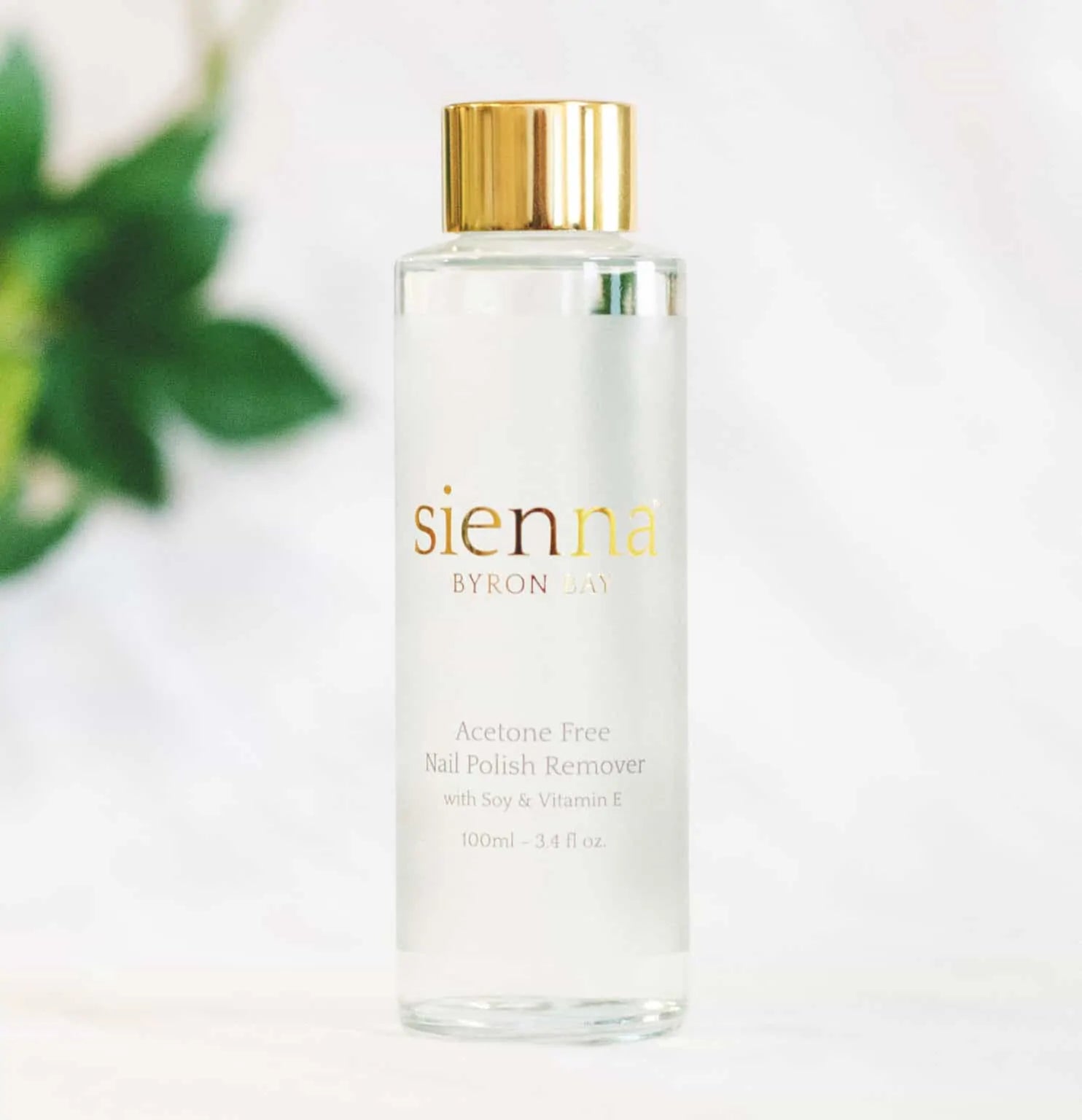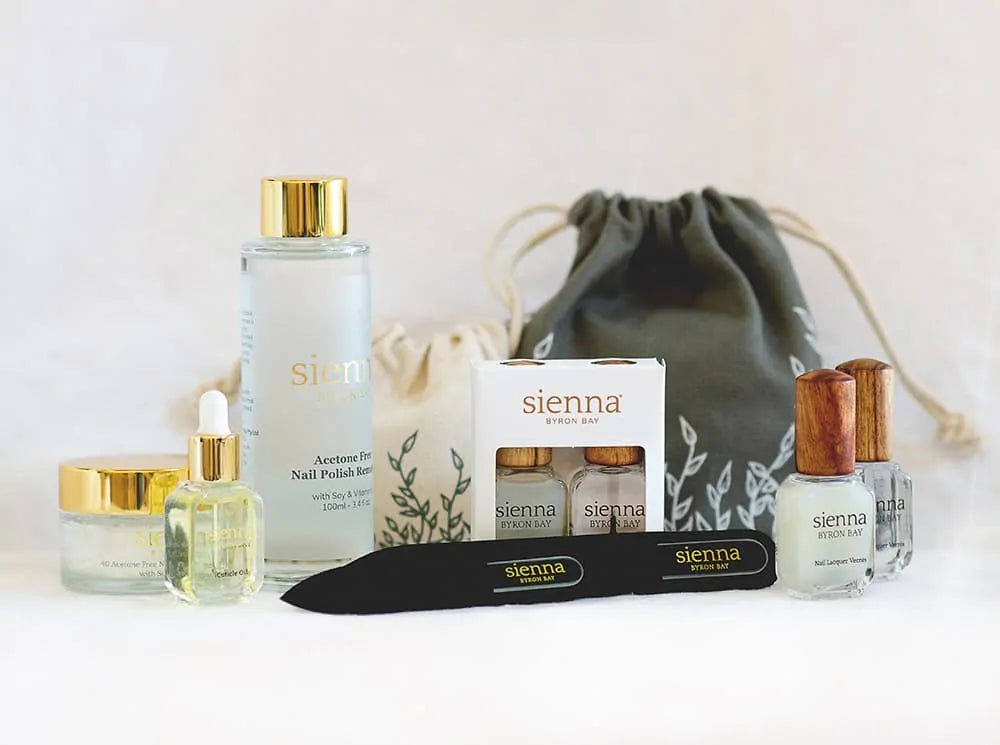Sienna FAQs – Part II
Welcome to Part Two of our FAQ series! People are more interested than ever before in the products they are using and how brands make them. We think this is a good thing. So in the spirit of supporting this curiosity and, in our quest for transparency, allow us to present “Sienna FAQs – Part II”.
So whether you are new to Sienna or a clean nail polish convert since way back in the day, here we go!
Does a nail polish remover made from water really remove your nail polish?
Of course it does! We might be all about clean beauty and keeping it sweet for the planet, but we’re all about efficacy too! If you have used this absolute HG of a product you will know that it might take a little longer to work the polish off, but there is no bad smell at all. None. We’ve also included some nutrient-rich ingredients like Vitamin E – an absolute superstar when it comes to nail health – as it not only moisturises your skin and nails, it also helps treat yellow nail syndrome. By using a nourishing remover and steering clear of drying ingredients (like acetone, which is found in many mainstream removers), your nails are less likely to become brittle and break. Did we mention the glass bottle can be recycled? (It can).

What can I do to get my nail polish to last longer?
AKA, the million-dollar question. There are so many reasons that nail polish lasts longer on some people than others. Genetics, nail health and application technique are all factors in how long your manicure will last. Other enemies of the mani include prolonged exposure to hot water, alcohol in other beauty or cleaning products, a lot of time spent in heavily chlorinated swimming pools and, this one is for the parents of small children, Lego. Those colourful small blocks are hell when it comes to keeping your manicure looking good. So if you are experiencing the odd mani-misadventure, we have written some more in-depth posts on our blog. Follow the links for more: 10 tips to maximise the life of your manicure and Easy steps to a non-toxic manicure at home.

Is it safe to use nail polish during pregnancy?
This is one of our most common questions. And… we don’t know the answer. No product can give you that kind of reassurance. We see all sorts of claims in the marketplace about natural nail polish/makeup being safe for pregnancy and, while generally, most products are fine, it’s a very big call to say it is safe without independent tests. Our formula is the cleanest one out there, but we would NEVER, EVER consider testing this in-vitro to get an answer. When you take into account the variety of pregnancy needs, you need to get the individualised care and advice that’s right for you and your baby-boo. If you’re having a baby (congratulations!) and you’d like to continue wearing nail polish, run it past your doctor, midwife or OB first. It is great we live in a world where people are paying attention to the make-up of their makeup, so we have listed all the ingredients of our products in the FAQ section of our website.
What is the difference between sienna base coat and top coat?
Did you know they are designed to do different things? Let’s talk about our much-loved Base Coat. Our Base Coat is designed to stick to your natural nail. It’s nice and thin so it creates a smooth base for your nail polish colours to stick to. You’ll still get a lush, durable Sienna manicure without it, but the Base Coat is just a little extra care that will strengthen your nails and protect them. On the flip side, if you want an everyday slick of clear gloss to protect your nails, this is the one you should go for. It also has the added benefit of strengthening your nail by acting similarly to a band-aid. It holds your nail together so you’ll get more length and strength and less breakage.
Now for our super-shiny Top Coat. This formula likes a sticky surface – wet nail polish, for instance. This thick, glossy coat gives you a high-gloss, salon-style finish and completely seals the polish. It dries much harder than the colour formula so you know your mani/pedi will be in it for the long haul. From a functional perspective, the Top Coat is also a quick-dry formula which means your polish will be touch-dry in about two minutes. It’s a good idea to wait about 15-20 minutes before you take the deep dive into your bag for your keys/wallet/keep-cup/phone though, as all the micro-layers underneath need a bit more time to dry.
Both the Base Coat and Top Coat will help you get longer from your Mani/Pedi.

What is the difference between cruelty-free (cf) and vegan products?
Put simply, cruelty-free (or cf as you will often see it, particularly on products from the UK) means that a product and its ingredients were not tested on animals, nor are they sold in countries where animal testing is mandatory. Leaping Bunny (one of the organisations that has certified Sienna) has an informative FAQ section if you want to explore this further. A vegan beauty product is one that contains no animal ingredients. Confusingly though, it is possible for a vegan product to have been tested on animals, and a cruelty-free product to be not vegan. If animal welfare is a deal-breaker for you, look for a brand that is both cruelty-free and vegan. The New York Times has this super-informative article which explores the reasons why the future of the beauty industry is vegan and not animal-tested. Hello, green science!
How are our timber caps made?
Ah, our beloved timber caps. We like to keep it humble over here, but we are the OG when it comes to timber caps on nail polish. When Sienna launched in 2014 it was often our signature timber caps that people commented on. And how could you not? They’re gorgeous! We don’t want to spill all the tea when it comes to our caps, but here’s what we can share. Our caps are made from a local timber. While the timber itself is stunning, the tree itself is a total weed in the wild rainforest areas around Byron Bay. It grows like crazy (technical horticulture term) and is very destructive as it inhibits the growth of native vegetation. When Danielle was hatching plans for Sienna way-back-when, part of her vision was to use this non-native weed wood in packaging and help revegetate local rainforest at the same time. It took a bit of trial and error to get it right, but after a few experiments with local woodturners, the solid timber cap you know and love today was born.

 AUS & International
AUS & International
 USA
USA



Leave a comment